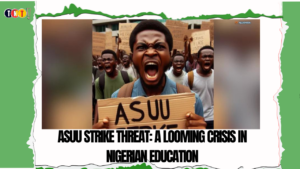The Academic Staff Union of Universities (ASUU) has once again issued a strike threat, sending ripples through Nigeria’s higher education sector. On August 20, 2024, ASUU announced a 21-day ultimatum to the Federal Government, demanding the fulfillment of agreements previously reached between both parties. This potential strike could have far-reaching implications for students, educators, and the nation’s educational system.

Causes of ASUU Strike Threat
- Funding for University Revitalization: One of ASUU’s primary demands is the provision of adequate funds to revitalize public universities. This issue has been a bone of contention for years, as many of Nigeria’s universities suffer from poor infrastructure, outdated facilities, and a lack of essential resources. ASUU argues that without significant investment, the quality of education in Nigeria will continue to decline.
- Earned Academic Allowances: Another key issue is the payment of earned academic allowances (EAA) to university staff. These allowances, which are additional to regular salaries, are meant to compensate lecturers for the extra work they perform, such as supervising postgraduate students and conducting research. ASUU claims that many lecturers have not received these allowances, leading to widespread discontent.
- Salary Structure: ASUU has also called for a review of the salary structure for academic staff. The union contends that the current salaries are not commensurate with the workload and responsibilities of lecturers, especially when compared to their counterparts in other countries. This disparity, they argue, contributes to the brain drain, with many Nigerian academics seeking better opportunities abroad.
- Implementation of Previous Agreements: Perhaps the most pressing issue is the government’s failure to fully implement previous agreements reached with ASUU. Over the years, several Memoranda of Understanding (MOUs) and Memoranda of Action (MOAs) have been signed, but ASUU claims that many of these agreements have not been honored, leading to a cycle of strikes and disruptions.
Government Response
The Federal Government has responded to ASUU’s ultimatum by acknowledging some of the union’s concerns but also highlighting efforts to address them. The Minister of Education, Tahir Mamman, has called for dialogue, urging ASUU to avoid another strike that would further destabilize the educational system. However, ASUU remains skeptical, citing the government’s track record of unfulfilled promises.
Impact of a Potential Strike
If ASUU goes ahead with the strike, the impact will be significant:
- Students: Over 1.5 million university students could see their education disrupted once again, delaying graduations and causing a ripple effect in the labor market.
- Academic Calendar: The academic calendar, already strained by previous strikes and the COVID-19 pandemic, will face further disruptions. This could lead to overcrowded classrooms and a rush to cover missed syllabi when classes eventually resume.
- Public Perception: Public trust in Nigeria’s higher education system, already low due to frequent strikes, could erode further. Many students and parents have expressed frustration with the constant interruptions to academic programs.
Solution to ASUU Strike Threat
For Nigeria to avoid yet another protracted ASUU strike, there needs to be a combined effort by both the government and the union to reach a lasting resolution. This could involve:
- Good Faith Negotiations: Both parties must engage in sincere negotiations, with the government providing clear timelines for the implementation of agreed-upon measures.
- Increased Funding: The government should prioritize funding for the education sector, recognizing its critical role in national development.
- Accountability and Transparency: Both ASUU and the government must ensure that agreements are transparent and that there are mechanisms in place to monitor their implementation.
- Dialogue: Continuous dialogue, rather than reactive strikes, should become the norm in resolving disputes between the government and ASUU.
Conclusion
The ASUU strike threat is a stark reminder of the persistent challenges facing Nigeria’s higher education sector. As the 21-day ultimatum counts down, the government and ASUU have an opportunity to avert a crisis that would have devastating consequences for the nation’s students and the broader society. The time to act is now, before the looming strike becomes a harsh reality.



